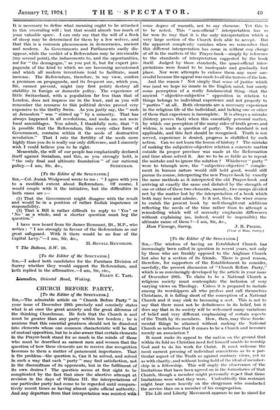CHURCH BEFORE PARTY.
[To the Editor of the SPECTATOR.]
SIR,—The admirable article on "Church Before Party" in your issue of December 20th precisely and concisely states what is at once the great anxiety and the great dilemma of the thinking Churchman. He feels that the Church is and must be greater than any party within her borders ; he is anxious that this essential greatness should not be dissolved into elements whose one common characteristic will be that of mutual opposition, but he is also aware that certain elements in the Prayer-book stand for so much in the minds of those who must be described as earnest men and women that the question of how these elements are to receive due recognition becomes to them a matter of paramount importance. That is the problem—the question is, Can it be solved, and solved in such a way that each " party " may find satisfaction, not in the discomfiture of its opponents, but in the fulfilment of Its own desires ? The question seems at first sight to be complicated by the fact that since the abortive attempt at revision in the days of William III. the interpretations of one particular party had come to be regarded until compara- tively recent times as having almost quite official authority. Mid any departure from that interpretation was resisted with some degree of warmth, not to say clamour. Yet this is to be noted. This " non-official " interpretation has so far won its way that it is the only interpretation which a very large section of the Church feels able to accept. But the apparent complexity vanishes when we remember that
this different interpretation has come in without any change at all in the matters of the Prayer-book—simply by reference to the standards of interpretation suggested by the book itself. Judged by those standards, the quasi-official inter- pretations were found to be inadequate and gradually lost place. Nor were attempts to enforce them any more suc- cessful because the appeal was made to all the terrors of the law.
And the reason Not simply that sense of justice which was (and we hope is) innate in the English mind, but surely some perception of a really fundamental thing—that the ancient " objective-subjective " opposition in relation tr things belongs to individual experience and not properly ta " parties " at all. Both elements are a necessary experience in the religious life of the individual, and lacking one or other of them that experience is incomplete. It is always a mistake (history proves that) when this essentially personal matter, by which our perception of the many sides of truth grows and widens, is made a question of party. The standard is not applicable, and this fact should be recognized. Truth is not served, experience is denied, progress is stultified by such action. Can we not learn the lesson of history ? The mistake of making the subjective-objective relation a concrete matter outside its proper province was made at the Reformation and time alone solved it. Are we to be so futile as to repeat the mistake and to ignore the solution Whichever " party" were to triumph now, the " subjective-objective " comple- ment in human nature would still hold good, would still pursue its course, interpreting the new Prayer-book by exactly the same methods as it interpreted the old Prayer-book and arriving at exactly the same end dictated by the strength of one or other of these two elements, namely, two camps divided not by the matter but by the interpretation of a book which both may love and admire. Is it not, then, the wiser course to enrich the present book by well-thought-out additions reflecting the needs of the time rather than to attempt a remodelling which will of necessity emphasize differences without explaining (as, indeed, would be impossible) the ultimate cause of them ?—I am, Sir, &c.,
(Vicar of Ham, Surrey.)






































 Previous page
Previous page